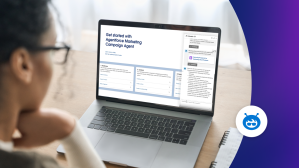Editor’s note: For the latest Salesforce research and insights on the future of digital skills, go here.
It’s a digital-first world: Today’s kids learn coding before cursive. We call this expertise “digital skills,” but to the next generation, they’re simply “skills.”
But what exactly are digital skills? How do people view the rise of digital skills? What can companies do to bridge the gap between current skill level and what the future demands?
To answer questions like these, Salesforce spoke to experts and conducted global research on digital skills.
This article gives an overview of digital skills, answering some common questions and sharing related research.
What are digital skills?
Digital skills are broadly defined as the skills needed to “use digital devices, communication applications, and networks to access and manage information,” from basic online searching and emailing to specialist programming and development.
At their core, these skills help people communicate and collaborate, develop and share digital content, and problem solve in a work-anywhere world.
What are examples of digital skills?
Entry-level digital skills can include:
- Computer literacy
- Data entry
- Social media
- Web-based communications and research
- Word processing
- Email and chat
- Secure information processing
Advanced digital skills can include:
- Programming, web, and app development
- Digital business analysis
- Digital marketing and content creation
- Digital design and data visualization
- Digital product management
- Data science
- User experience design
Why are digital skills important?
The pandemic catalyzed an already-accelerating rate of digital transformation, where the old ways of doing things — from grocery shopping to work — changed irreversibly. The demand for digital skills was likewise impacted, as companies shifted from physical headquarters to embracing a digital HQ mentality.
While this trend had been gaining momentum for decades across all industries, today’s acceleration is unprecedented. Now, digital adoption and the respective digital skills needed to embrace the transformation are critical to landing more secure, in-demand tech careers. In fact, those skills are essential to the survival of businesses.
Digital skills have never been more critical to business and the workforce, as demonstrated by the universal shift to digital-first interactions like remote work, online commerce, and virtual collaboration. While this change has produced many benefits, like greater flexibility for workers and removing geography as a barrier to hiring new talent, it’s also resulted in the widening of an already-large skills gap.
What is the digital skills gap?
Simply put, the digital skills gap means there’s just not enough people with the right digital skills to power companies’ transformation now and in the future.
There is low supply and high demand for digital skills, and the gap continues to widen due to factors like:
- Tech talent outpacing an already short supply (in fact, 54% of American workers believe technology will advance faster than workforce skills)
- Emerging technologies that amplify the need for digital skills
- High costs and disorganized approaches to traditional education that increase barriers to learning
- Access to digital infrastructure and skills limited by socio-economic status
The economic implications of the digital skills gap are massive. Research from Salesforce and RAND Europe shows that the digital skills gap is disruptive to business growth, citing that 14 of the G20 Countries could miss out on $11.5 trillion in cumulative GDP growth.
The democratization of digital skills will not reach every country, industry, and community equally. Until people from underserved and underrepresented backgrounds get equal access to technology and education for re-skilling, the skills gap will continue to grow. Success, prosperity, and equality in the new digital-first world depend on everyone having the skills to participate.
Developing digital skills for the future
As technology evolves, so do digital skills.
Decades ago, email was a new concept, but it’s become second nature for billions of people. Now more recent technologies like blockchain, AI and the cloud have gone from niche, specialized roles to the mainstream, increasing business requirements for digital skills by up to 50% in Europe and the United States.
The task of learning new digital skills can be daunting. Not only can it be hard to know where to start, but the educational wealth disparity has been a barrier for many who don’t have the resources to invest in a four-year degree. Further still, it’s important to recognize there is no one-size-fits-all approach.
Micro-degrees, or super-focused online degrees in a specific area of study, can help bridge that divide. Instead of adding to the $1.7 trillion currently owed in student debt, people can quickly earn more focused degrees that can lead to new jobs in specified fields, like IT.
In addition, those micro-degrees also can help propel people within industries where they already work or open a door for people looking for a career change. Trailhead, for example, is Salesforce’s free online learning platform that helps anyone skill up for jobs in the Salesforce ecosystem. Salesforce’s Trailblazer Community accelerates this learning through peer-to-peer knowledge sharing and support.
As Salesforce Chair and CEO Marc Benioff said in an interview with NBC, “Everybody thinks that if you don’t have a college degree, you can’t be successful in the United States and it’s not true. You can create incredible value for the world without a college degree.”
Salesforce supports the skilling imperative via a variety of platforms, projects, initiatives, and investments that offer something to everyone. Ultimately, these efforts work together to seek to help people of all backgrounds find and confidently progress their own skilling journey to rewarding, life-changing employment.
Salesforce does this through free training via Trailhead, the Trailblazer Community, the creation of partnerships with leading education providers, and by delivering a variety of trailblazing apprenticeship, skilling, grants and philanthropic programs internationally.
Working with partners
- Today, the ecosystem of Salesforce partners delivering cloud services to customers is five times as big as Salesforce itself, and will be more than six times as big in 2026. Salesforce’s partner ecosystem is a driving force behind the Salesforce Economy’s massive growth, as detailed in the 2021 IDC study.
Creating job opportunities and future digital leaders
- Salesforce collaborates with educators around the world to help teach digital skills for today’s workforce — offering apprenticeships to young adults from underserved, underrepresented communities.
- Salesforce’s Futureforce university recruiting program is dedicated to attracting, retaining, and developing graduate talent.
- The Trailblazer Community is a network of 15 million people across the Salesforce ecosystem who help each other learn new skills and succeed with Salesforce. The Trailblazer Community offers an online platform to connect from anywhere, as well as more than 1,300 active regional and interest-based groups around the world. Trailblazer Mentorships connect mentees to opportunities to land dream jobs in the Salesforce ecosystem. All levels are welcome — no degree or prior Salesforce work experience is required.
Workforce development programs
- Salesforce Talent Alliance is an initiative that connects partner companies to a diverse pool of Salesforce-trained candidates in an effort to skill up the workforce of the future.
- Pathfinder Training Program, launched in 2018 in collaboration with Deloitte, is a workforce development initiative designed to train individuals with the technical, business and soft skills necessary to pursue a career in the Salesforce ecosystem.
- Salesforce Military offers free, online training classes and certification exams at no cost for active-duty military, veterans, and military spouses. Salesforce connects a talented pipeline with partner companies to help grow, strengthen, and diversify their workforce.
- Trailblazer Connect helps people connect to mentorship and career opportunities through events and online resources.
- Salesforce.org supports nonprofits and schools working to close the opportunity gap for future generations through education via Salesforce’s 1-1-1 model.
Online learning platforms like LinkedIn Learning, Pearson, Edraak, Coursera, Udemy, Skillshare, and more offer access to in-demand skills as well. The proliferation of these platforms is allowing more people to attain specific skills whenever, wherever, and however they want — and opening doors to people all over the world to gain access to skills that can lead to more economic opportunities.
With the continued shift toward a work-anywhere, digital-first world, it’s important for companies to offer support for upskilling and reskilling.
Together, with stronger digital skills developments and offerings, we can help drive greater success and equality for all.















